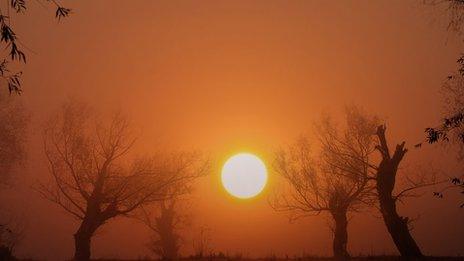Polar vortex: What role does climate change play?
- Published
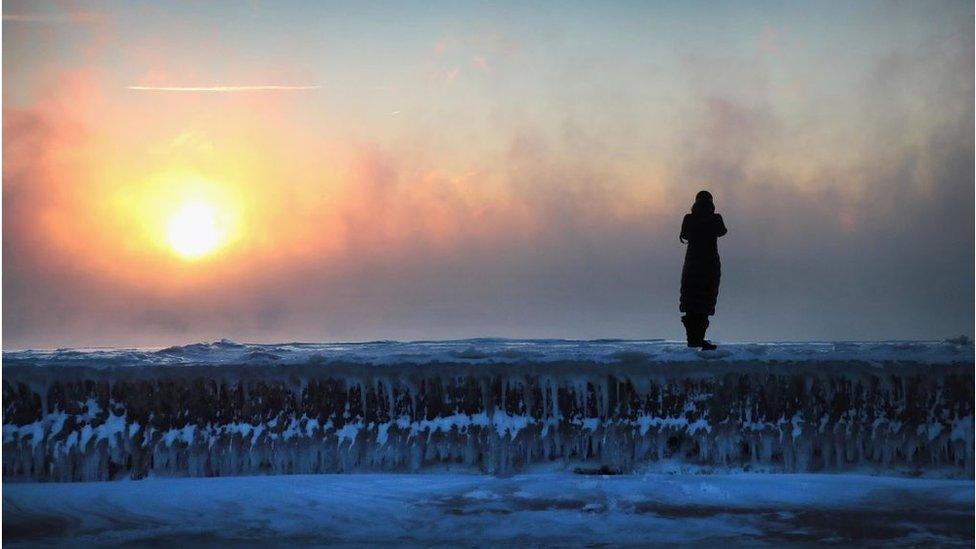
As a third of the US grapples with brutally cold weather, scientists are assessing how much this might be down to long-term changes to our climate.
So whatever happened to global warming?
That's certainly what President Donald Trump wanted to know when he tweeted this, external a couple of days ago:
Allow X content?
This article contains content provided by X. We ask for your permission before anything is loaded, as they may be using cookies and other technologies. You may want to read X’s cookie policy, external and privacy policy, external before accepting. To view this content choose ‘accept and continue’.

There is no question the Midwest is cold - very cold.
Just check the advice from the US National Weather Service. It has warned that the current low temperatures could easily "freeze the flesh off your bones".
Don't leave home if you can avoid it, the NWS in Iowa urged, and if you do have to go out, "avoid taking deep breaths; minimise talking".
Meanwhile the internet is heaving under images of snow and ice.
My favourites include the icy steam pouring off lake Lake Michigan and the thousands of people who have been doing the "hot water challenge".
Allow X content?
This article contains content provided by X. We ask for your permission before anything is loaded, as they may be using cookies and other technologies. You may want to read X’s cookie policy, external and privacy policy, external before accepting. To view this content choose ‘accept and continue’.

Is the president right?
So, is this brutal cold snap evidence that global warming is faltering?
Sadly, the answer is no, as one of the president's own agencies quickly pointed out in an apparent response to his tweet.
"Winter storms don't prove that global warming isn't happening" tweeted the National Oceanic and Atmospheric Administration.
Allow X content?
This article contains content provided by X. We ask for your permission before anything is loaded, as they may be using cookies and other technologies. You may want to read X’s cookie policy, external and privacy policy, external before accepting. To view this content choose ‘accept and continue’.

The NOAA included a link to an article which suggests that severe snowstorms may even become more likely, external as the world warms.
You have probably already heard that the current brutal weather is thanks to something called the "polar vortex".
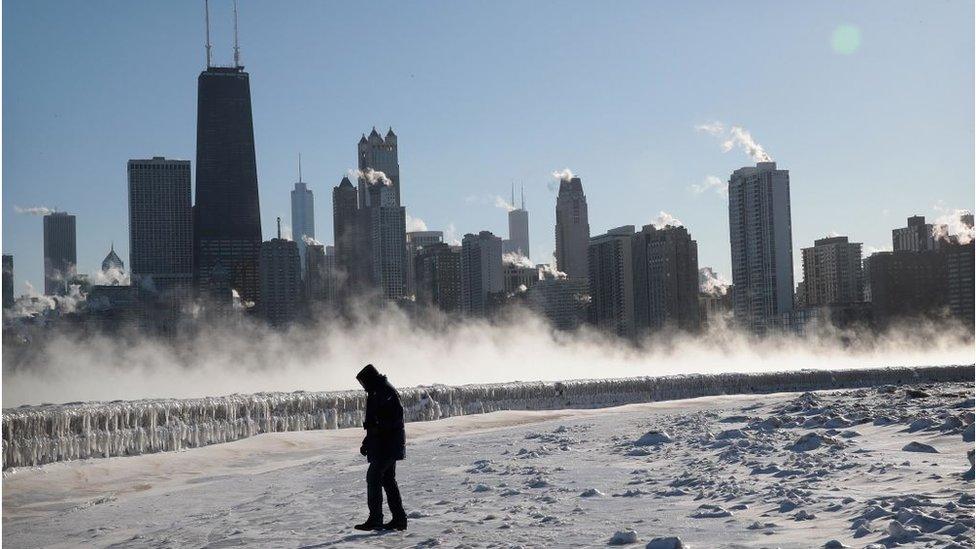
A man walks along the Chicago lakefront in frigid conditions
The polar vortex is a great gyre of air that forms each winter and circulates above the North Pole, way up in the stratosphere.
It is like a whirlpool which holds icy polar air within a wall of powerful circular winds.
There's a great graphic illustrating how it works at the New York Times, external.

More on climate change

Sometimes the vortex breaks down, splitting up and spilling cold air out from the polar regions.
That is reckoned to have happened on the 3 January this year.
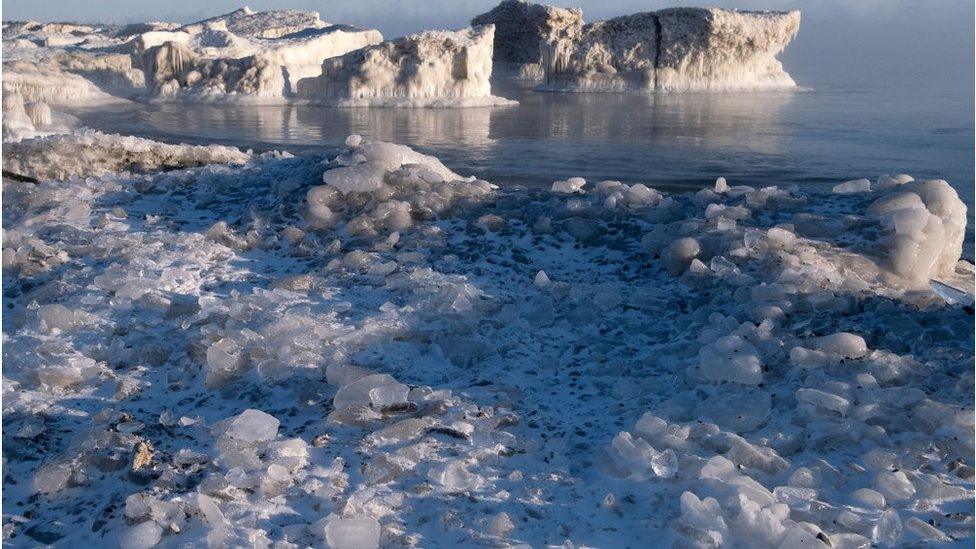
The lakefront in Wisconsin looks more like Antarctica
The frigid air from the polar vortex warps the jet stream - another powerful air current, but much lower in the atmosphere - making it bulge down southwards.
It is this bulging of the jet stream that brought the merciless cold to the US this week, and the so-called Beast from the East to Europe last year.
But is it caused by climate change?
There is much debate within the world of meteorology about whether or not this breakdown of the polar vortex is becoming more common.
Some studies suggest that it is, external, and some researchers say they suspect that this is down to climate change.
Jennifer Francis is a senior scientist at the Woods Hole Research Centre, which studies climate change impacts and solutions.
She argues that melting sea ice in the Arctic may be linked to changes in the polar vortex.
The dark, open ocean absorbs more heat than reflective ice, causing a hot spot, she told the New York Times, external.
She argues this hot spot, along with changes in the jet stream driven by climate change, could cause the polar vortex to break down.
But this is controversial stuff. Tim Woolings, a climate physicist at Oxford University, is not persuaded we are seeing a significant change.
The atmosphere is, he says, "a very noisy system" and "there is no convincing evidence that these events are happening more often".
Weather versus climate
The important thing is to look at long-term average temperatures.
The current bone-cracking cold in Chicago is "weather" not "climate".
The rule of thumb is that weather is what is happening outside your house now; climate is what happens over many years.
So, it can be very cold where you live but the world as a whole could still be getting warmer.
And be in no doubt, says Tim Woolings, the world is continuing to warm.
As Chicago freezes, wildfires are raging in Australia, external which is in the grip of yet another blistering summer.
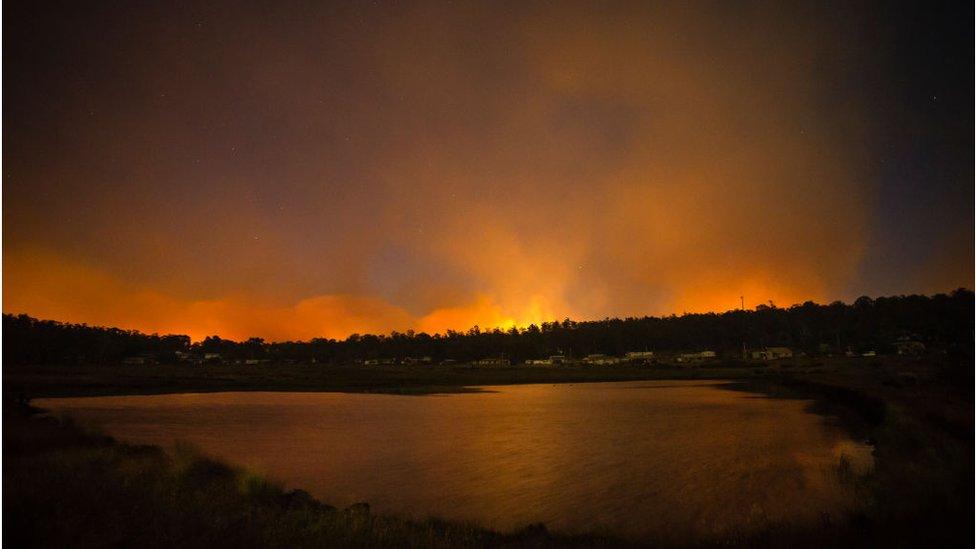
Fires burning dangerously close can be seen from a lodge in Miena, Australia
The 20 warmest years on record have all been in the past 22 years, with 2015 to 2018 making up the top four, according to the World Meteorological Organization.
And if that does not persuade you, check out these seven charts.
This will be cold comfort for those of you shivering in the Midwest but, says Tim Woolings, the icy air that engulfed you this week would have been at least a degree colder had it not been for the warming that has already raised average winter temperatures in the arctic.
- Published27 December 2018
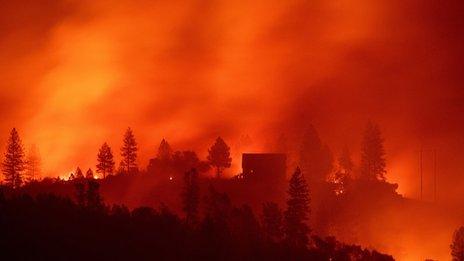
- Published14 January 2020
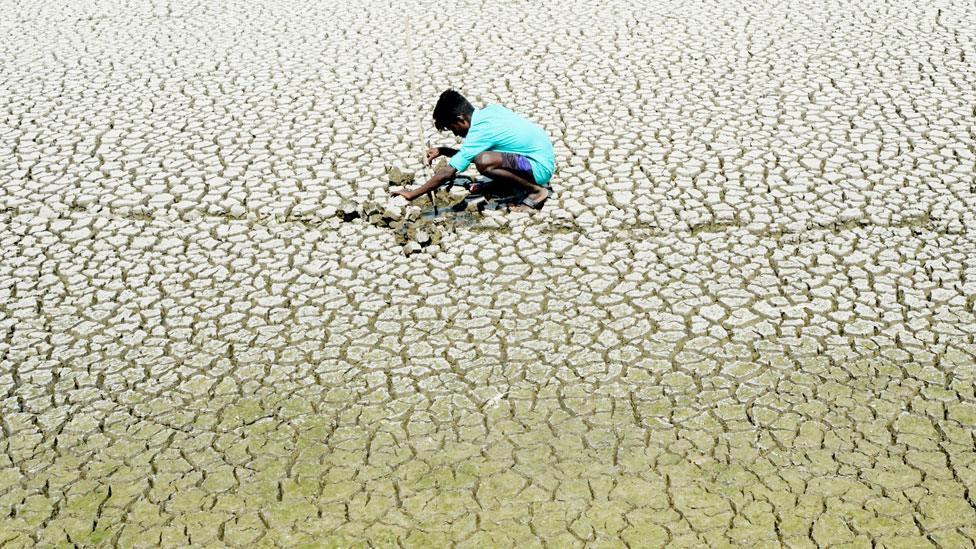
- Published25 January 2019
